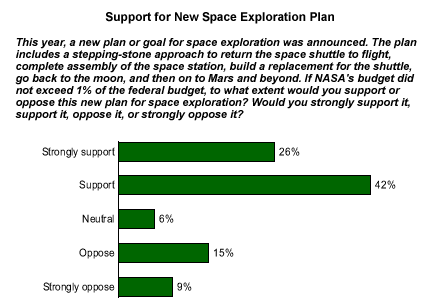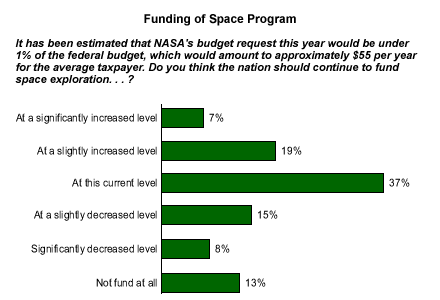"Mankind is drawn to the heavens for the same reason we were once drawn to unknown lands and across the open sea. We choose to explore space because doing so improves our lives and lifts our national spirit."
--President George W. Bush, Jan. 14, 2004
Early this year, President George W. Bush outlined the most ambitious plan for America's space program in decades. The plan includes returning to the moon and building a station there to explore farther into space, including the planet Mars. Last month, a House panel reduced funding that included money for missions to the moon and Mars, so it remains to be seen whether Bush's "vision for space exploration" will be realized.
A recent Gallup Poll on America's space program, conducted for the Space Foundation, shows that the public is intrigued with space flight, willing to support the new plan, and generally aware of the benefits of space exploration. But Americans are more divided on the topic of funding the space program.
Space: Who Cares?
Space doesn't just interest astronomers and science geeks. A majority of Americans say they are either "very interested" (24%) or "somewhat interested" (43%) in the space program. On the other end of the spectrum, 18% are not very interested and 11% are not at all interested.
Men are more likely than women to be very interested in the space program, 34% to 15%. Among age groups, those between the ages of 50 and 64 are the most likely to be very interested.
Why Do We Explore?
So, what continues to drive American space exploration? Americans were given five possible reasons as the main reason for space exploration. While there is not a wide consensus, the poll finds the most common reason chosen is that it is "human nature to explore" (29%). Twenty-one percent say the main reason is to maintain the United States' status as the international leader in space. Another 18% believe the main reason is to provide benefits on Earth, while 12% cite keeping the nation safe, and 10% say it inspires people and motivates children.
Support for the Vision
The poll also asked the public about funding for the space program, first describing the proposed plans and then asking for their strength of support or opposition, provided that the budget did not exceed 1% of the federal budget. Sixty-eight percent of Americans support the new plan as described, including 26% of whom support it strongly. One in four Americans (24%) oppose the plan as described to them.

There is a slight political bent in support for the new vision, with Republicans more likely to support it strongly and Democrats are more likely to oppose it. However, majorities of both parties support the vision. Jim Banke, the Space Foundation's director of communication, feels that space exploration should transcend political barriers. "This question illustrates that you can take the politics out of space and find common excitement in exploration. Exploration is not partisan, " he says.
Benefits of Space
A majority of the public (68%) agrees with the statement "the quality of our daily lives has benefited from the knowledge and technology that have come from our nation's space program." Sixteen percent disagree, and another 16% are neutral on the topic.
Banke points to several aspects of daily life that the space program has affected: "Just look at the Weather Channel. Those accurate forecasts come from satellites, and satellites are in space. Or just go into any electronics store. I'd bet that 80% of the products there are available because of the space program…increased data storage, satellite television and radio, global positioning systems, the list goes on and on."
Budget Matters
Like any government program, space exploration requires funding. Bush's vision for space exploration was dealt a blow in mid-July, when the U.S. House of Representatives Committee on Appropriations recommended that significantly less funds be allotted. All told, the budget recommendations were $1.1 billion less than the $16.2 billion requested for NASA.
To gauge support for funding the space program, Gallup first gave Americans an estimation of NASA's budget request this year and the approximate taxpayer cost, and then asked about continued funding. In response, a quarter (26%) of Americans say funding for the space program should be increased, 37% believe funding should continue at its current level, and 36% think it should be decreased or not funded at all.

Bottom Line
The benefits of research and space exploration intrigue Americans, and the poll indicated they tend to favor the new space program as described in the survey. However, such ambitious programs are almost bound to encounter resource issues in the real world. Americans seem willing to support space exploration as long as the costs aren't astronomical.
*The survey results are based on a nationally representative sample of 1,000 telephone interviews with a general population sample of adult men and women aged 18 and older, residing in telephone households. Interviewing was conducted by The Gallup Organization during the period of June 22-July 7, 2004. The survey was commissioned by the Space Foundation in an effort to better understand the extent of support and public attitudes toward America's space program. For results based on samples of this size, one can say with 95% confidence that the error attributable to sampling and other random effects could be ±3 percentage points.
